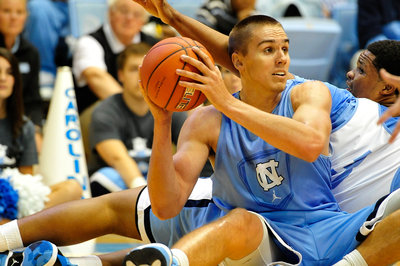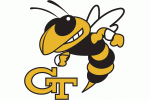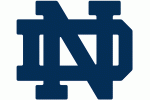Back in June the NCAA rule oversight committee for men's basketball approved a new block/charge call and made the point of defining certain types of fouls in the rulebook. Via the NCAA here is what these adjustments look like.
The NCAA Playing Rules Oversight Panel approved a change to how block/charge calls will be made in men’s basketball, effective for the 2013-14 season.
Under the revised block/charge call in men’s basketball, a defensive player is not permitted to move into the path of an offensive player once he has started his upward motion with the ball to attempt a field goal or pass. If the defensive player is not in legal guarding position by this time, it is a blocking foul.
Previously, a defender had to be in legal guarding position when the offensive player lifted off the floor.
The Men’s Basketball Rules Committee believes this will give officials more time to determine block/charge calls. Committee members also believe the tweak to the block/charge rule will:
• Allow for more offensive freedom
• Provide clarity for officials in making this difficult call
• Enhance the balance between offense and defense
In Division I games last season, the average amount of points scored in games was 67.5. This is the lowest amount since the 1981-82 season when teams averaged 67.6 points per game. The points per game average has also dipped in each of the last four seasons at the DI level.
With these facts in mind, much of the committee’s discussion in May focused on ways to open up the game. To that end, it will be stressed to officials that they must address the current rules throughout the game. The following types of personal fouls should be called consistently:
• When a defensive player keeps a hand or forearm on an opponent
• When a defensive player puts two hands on an opponent
• When a defensive player continually jabs by extending his arm(s) and placing a hand or forearm on the opponent
• When a player uses an arm bar to impede the progress of an opponent
I know, I know. There is a pretty good joke about Duke's defense in there somewhere.
 The block/charge rule is being tightened up to prevent secondary defenders from simply sliding into the path of a player who has already picked the ball up and has begun his shooting motion. This is the way it should be because sliding in front of a player who is already going up for a shot and making no attempt to play the ball is not playing defense. Once an offensive player picks up the ball and starts upward for his shot, he doesn't have the option stopping if someone slides in his path at that point. The way this rule is written, you are either rotating to set yourself against a dribbler or coming to play the ball on a shot. There is no option to simply get in a shooter's way, absorb contact, fall down and get a call. And yes, officials are still going to screw this rule up more times than not because it continues to be a split-second judgment call.
The block/charge rule is being tightened up to prevent secondary defenders from simply sliding into the path of a player who has already picked the ball up and has begun his shooting motion. This is the way it should be because sliding in front of a player who is already going up for a shot and making no attempt to play the ball is not playing defense. Once an offensive player picks up the ball and starts upward for his shot, he doesn't have the option stopping if someone slides in his path at that point. The way this rule is written, you are either rotating to set yourself against a dribbler or coming to play the ball on a shot. There is no option to simply get in a shooter's way, absorb contact, fall down and get a call. And yes, officials are still going to screw this rule up more times than not because it continues to be a split-second judgment call.
As for the other new foul rules, they are basically just clear definitions of what kind of fouls should be called. The foul rules themselves didn't change but the NCAA clearly defining them in a way that could not be ignored did. NCAA director of officiating John Adams has replaced the annual "points of emphasis" with something called "The Rulebook."
"In the past, while these rules were on the book and should have been called, they weren’t highlighted in the body of the rulebook," NCAA officials coordinator John Adams told Sporting News. "Four clearly defined fouls are now in the rulebook. You can’t ignore them, and they’re not open to a great deal of interpretation."
In other words, the NCAA has taken the extra step of putting on paper the exact types of physical contact which are not permitted. That should include hand-checks, defenders in the post leaning against the offensive player, defensive players using forearms and hands to grab, impede or otherwise make significant contact with the offensive player. In other words, defense is to be played by staying in front of the offensive player or putting your hands up without touching him. Novel concept right?
According to pretty much everyone who has seen the games called according to these guidelines, the games are going to be painful early in the season. Even UNC players, having experienced these new standard in scrimmages have found it will require some acclimation. There will be more fouls called, games will take longer and it will be a tad on the ugly side. At some point the players will adjust to the way the game is called and it will open up the offense in general. If players can move freely around on the court it certainly puts a premium on being able to play solid defense.
College basketball is very much a point guard driven game and these rules probably reinforce that. If point guards can bring the ball up without being hand checked it should help the general offensive flow. If you have a point guard that can get by his defender on a regular basis and is a capable three point shooter, the usual "pick your poison" approach is even tougher. It will also be nice to see less physical play in the post. Players will need to defend the post by putting their hands up and trying to play the ball rather than using hands and arm bars to jostled the offensive player. Another area to watch will be cutters moving through the lane and if they are permitted to do so freely.
Overall, there will be an adjustment period but the end product should be a cleaner and more beautiful game. There probably should be some adjustment to how screens are called both when it comes to the width of the feet and the player moving. However, that would probably be too much change at once. Assuming these new guidelines open the game up and increase the scoring, a serious discussion of perhaps going to a 30-second shot clock can be had to help the game's general tempo.
Side note: As noted in The Sporting News piece, Roy Williams was chair of the rules committee in 2001 and led an effort then to clean up the physical nature of the game. Some coaches, at the time, complained that Williams was looking out for his own interests since a free flowing game would benefit his teams more. While less physical games are better for Williams' style, the reason these rules needs fixing is because watching football on the basketball court is awful. When you've reached a point where average scoring across all teams is the same as it was over 30 years ago when there was no shot clock, that probably means something is wrong with how the game is being officiated.



















